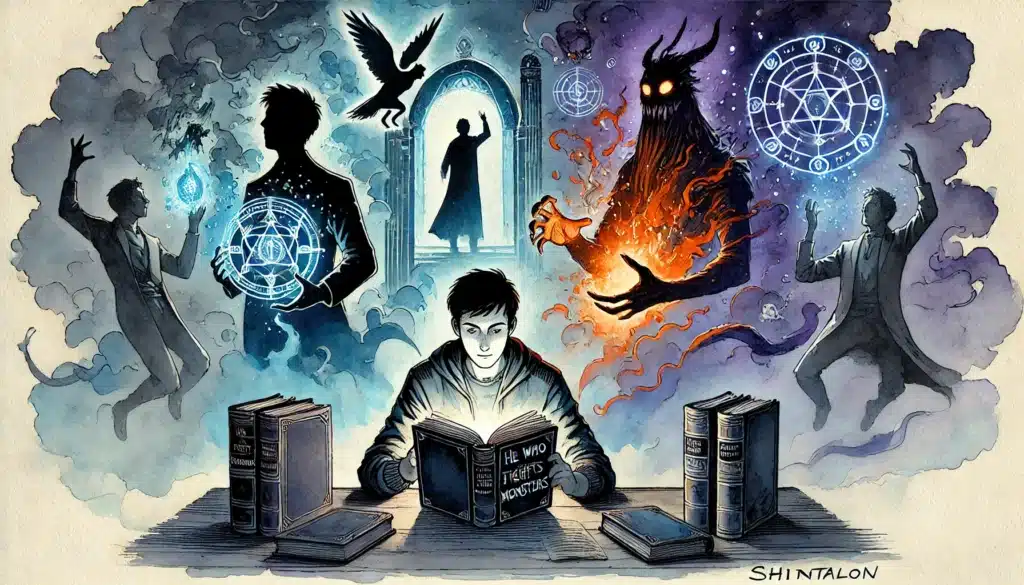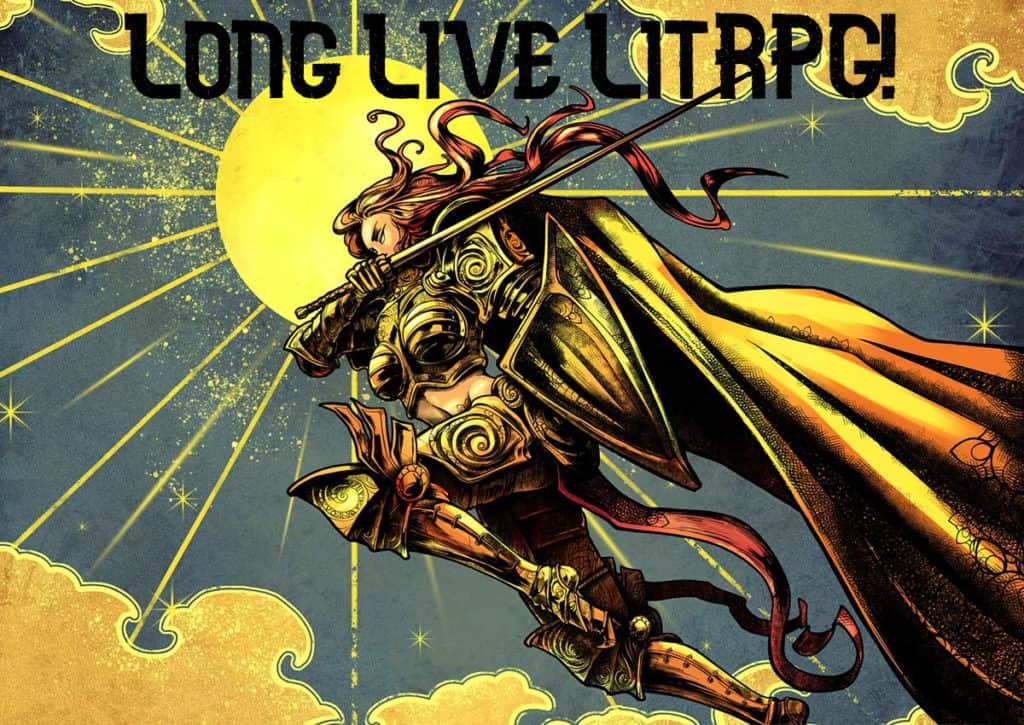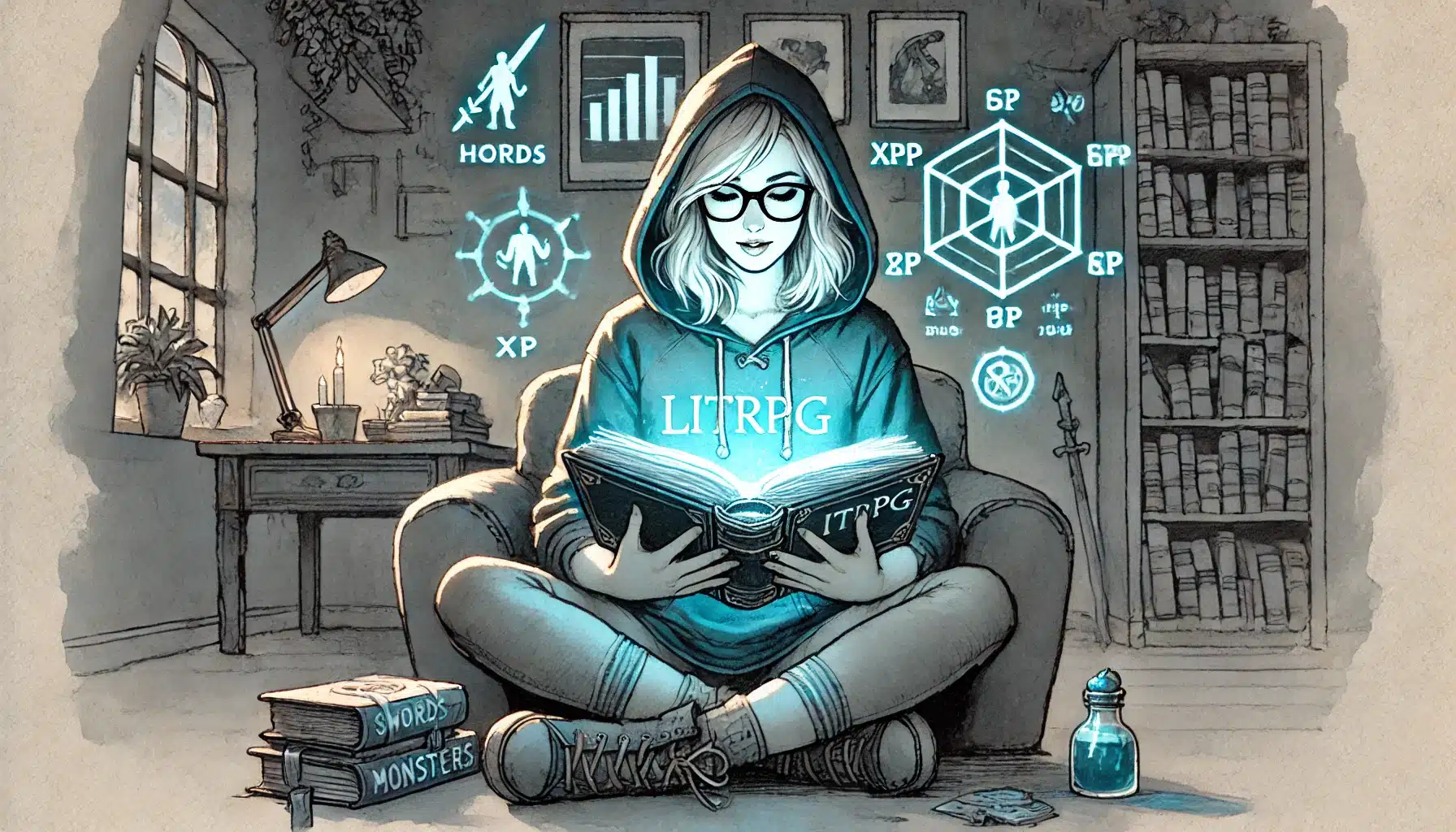Every once in a while, a book barrels onto the fantasy scene with enough raw momentum to topple genre expectations—and He Who Fights With Monsters by Shirtaloon (Travis Deverell) has not just rolled, but bulldozed its way into LitRPG stardom. If you’ve spent even a few hours around speculative fiction circles, you’ve likely seen this title pop up—first as a humble web serial with a rabid Reddit following, now as a burgeoning print phenomenon whose fandom shouts louder than a berserker’s battle cry.
At its heart, this is an isekai adventure—transporting a jaded Aussie everyman, Jason Asano, into a high-magic world where game mechanics are as real as gravity, and survival is tracked with digital precision. Fans love the snarky banter, snappily defined stats, and the sheer audacity with which Shirtaloon mashes together video game logic and sprawling epic fantasy. For many newcomers, it’s become the gateway drug to the entire LitRPG genre.
But where did it start? From its roots as a serial fiction experiment, He Who Fights With Monsters snowballed through word of mouth, Discord debates, and meme-laden threads—until Orbit Books stepped in and propelled it onto actual shelves. What was once a niche internet passion project now enjoys the kind of mainstream success reserved for the likes of Aleron Kong and Dakota Krout.
The question at the core of this review is deceptively simple: Does He Who Fights With Monsters live up to its almost mythological reputation? Is it a true must-read for LitRPG veterans—and more importantly, is this chaotic, irreverent ride the right entrance for those new to the genre’s weird, stat-laden delights? Let’s roll initiative and find out.
What Is He Who Fights With Monsters About?
At its most straightforward, He Who Fights With Monsters is the saga of Jason Asano, an intensely human protagonist who wakes up—baffled, barefoot, and annoyed—in a parallel world powered by magic, monsters, and ever-present “status screens.” He doesn’t just encounter this reality; he punches through it with the trademark irreverence and sarcasm of someone who’s read every urban fantasy and recognizes every genre trope he’s now forced to live through.
The setting blends a high-fantasy patchwork of kingdoms, factions, and arcane powers, but the tone is where Shirtaloon really sets his series apart. Jason faces mortal peril, ethical quandaries, and eldritch horrors with the flippancy of a guy who’s missed his morning coffee—and the result is a narrative voice that’s both bracing and polarizing. Expect verbal thumb-wrestling with gods, banter during boss fights, and a stubborn insistence that every RPG mechanic be poked, prodded, and occasionally ridiculed.
Try my AI Tabletop RPG generators...and an extensive library of content!
Whether it’s the clash of swords or ideologies, the story simply refuses to take its own grandiosity too seriously. Yet, darkness lurks beneath the quips—a world of shifting alliances, literal soul-eating magic, and the faintest whiff of existential dread. Jason may joke, but the consequences rarely pull their punches.
Key Elements in the Book:
- Status screens and immersive in-world menus
- Deep, tiered magic systems (essences, powers, affinities)
- Progression through levels, classes, and abilities
- Political intrigue and factional warfare
- Irreverent humor and genre-savvy quips
- Evolving “build” choices and tactical synergy
- Monsters both terrifying and absurd
- Australian slang and cultural in-jokes
- RPG inventory management (with memes!)
- Morality systems and hard choices
- Epic boss fights with real stakes
- Unreliable narrators and mythic backstory
- Social climbing from zero to hero
This unique blend is the book’s secret weapon: it feels relentlessly self-aware without sacrificing the high drama—a feat rare in a genre often mired in stat-dumps and power fantasies. Shirtaloon walks a precarious tightrope, balancing levity and gut-punch emotion that keeps you flipping pages well past midnight.
What truly distinguishes He Who Fights With Monsters from the LitRPG pack is its defiant fusion of intensity and irreverence. Worlds are built and burned at an almost reckless pace, but Jason’s sardonic commentary anchors it all, injecting the tale with a distinctly modern, human pulse. If you tire of swords-and-sorcery played with a straight face, this series delivers the antidote: chaos, wit, and enough snark to fuel a dozen seasons of Buffy.

Jason Asano: A Hero You’ll Love—or Hate
Jason Asano: cheeky, self-deprecating, and armed with the biting wit of someone who knows their only weapon might just be their silver tongue. Shirtaloon’s protagonist is as polarizing as he is memorable—half wisecracking underdog, half exasperating know-it-all. He’s the sort of main character who’ll trade a fireball for a pun, and argue with system prompts like he’s trolling a tech support agent.
⚔️ Fantasy RPG Random Tables Books
Make life as a Gamemaster easier…
If you play Dungeons & Dragons, Pathfinder, or other fantasy RPGs, this
RPG random tables series
is packed with encounters, NPCs, treasure, and more. Available in eBook or print—either way, you’ll have a wealth of adventure ideas at your fingertips.
For some, Jason’s running commentary is a breath of fresh air—a voice that punctures fantasy pomposity and serves up equal doses of social commentary and genre deconstruction. His modern-day skepticism, rooted in his Australian upbringing, simultaneously subverts and celebrates isekai conventions. For others, however, his stream of sarcasm can veer into the insufferable; if you’re allergic to irreverence and running jokes, your patience may be tested.
This all-in humor acts as both armor and Achilles’ heel. Jason builds real relationships (and enemies) in his new world, but even at his most vulnerable, he reflexively resorts to irony and cultural reference. This delightfully abrasive personality either turns readers into lifelong fans or exasperates them before the end of chapter one.
| Trait | Narrative Strength | Potential Reader Reaction |
|---|---|---|
| Witty | Tension breaker | Amused, delighted |
| Overconfident | Drives conflict | Annoyed, frustrated |
| Strategic | Satisfying progression | Impressed, invested |
| Sarcastic | Memorable narration | Divisive: love or hate |
| Empathetic | Emotional connection | Surprised, drawn in |
| Stubborn | Plot accelerator | Rooting for— or rolling eyes at him |
So much of the book’s success (and potential for irritation) lives or dies with how you respond to Jason’s singular voice. If you find yourself grinning at self-aware dialogue, you’ll dive headlong into his journey. If, instead, meta-commentary and pop-culture snark set your teeth on edge, you’ll be counting down the pages until the next dragon fight.
That said, Jason is not a static wisecracker. As the series progresses, the “mask” slips; regret, self-doubt, and unexpected empathy creep in between the punchlines. It’s this dynamic evolution—a growing, faltering, messily human protagonist—that ensures He Who Fights With Monsters is more than just a meme factory. Come for the jokes; stay for the growth (if you can handle the sass).
Progression Fantasy at Its Core
Nothing hooks a dyed-in-the-wool LitRPG reader like progression—and here, Shirtaloon doesn’t just deliver; he revels. From the moment Jason unlocks his first essence to the dizzying heights of multi-faceted abilities, the machinery of stats, skills, synergies, and strategic builds is not just present—it’s the beating heart of the narrative.
Every advance feels meaningful, not just a number ticked upward on an invisible spreadsheet. The series models a finely tuned game system, filled with tiers of power, RPG currencies, and a slowly unfurling tech tree that encourages experimentation. Characters are defined by their choices and their “builds”—creating a feast for armchair min-maxers and theorycrafters alike.
Yet, the series doesn’t neglect the drama of the climb. Each hard-won level echoes with consequence: unlocking new spells, navigating political landmines, or awakening powers that reshape the battlefield. The endless push for growth is more than XP for XP’s sake—it’s gift-wrapped in danger, laughter, and existential stakes.
Progression Elements Highlighted:
- Essence slots (basic, elite, legendary, etc.)
- Spirit coins as mystical currency
- Power ranking tiers (Iron, Bronze, Silver, Gold…)
- Ability synergies and customizable skills
- Loot drops and RPG-style inventory
- Spell upgrades and “awakening” powers
- In-game quest logs and system notifications
- Build crafting and class specialization
- Stat increases and attribute allocation
- Itemization, gear, and magical artifacts
- Achievement unlocks (with hilarious flavor)
- Tactical team synergies in combat
- Unique racial/class evolutions
This relentless focus on character improvement and “build optimization” scratches the same itch as a MMORPG marathon session—minus the wrist strain. Watching Jason cobble together weird, unconventional combinations in a world where the rules are just as meticulously spelled out as in your favorite rulebook is, frankly, a nerdy delight.
If you’re the sort to scrutinize stat sheets, argue the merits of different leveling strategies, or just crave the dopamine rush of incremental progress, He Who Fights With Monsters offers an endless banquet. It’s power fantasy, sure—but with just enough tactical nuance and real peril to keep you hungrily invested.
Strengths of the Series
Where does Shirtaloon’s epic truly shine? The answer is in its voice—a caustic, energetic, and utterly distinctive narrative style that banishes the generic and draws you in, whether you love Jason or love to hate him. The worldbuilding, too, is refreshingly robust: a living, breathing setting teeming with magical systems, layered politics, and creatures that feel equal parts D&D campaign and fever dream.
Plot pacing is finely tuned: periods of breakneck combat and zany humor are balanced by quieter moments of introspection, mythology-building, and surprising emotional resonance. Every character in Jason’s sprawling supporting cast gets their time in the limelight, each with their own motives and secrets. Faction drama, friendship arcs, and social power plays ensure the stakes always feel both epic and personal.
⚔️ Fantasy RPG Random Tables Books
Make life as a Gamemaster easier…
If you play Dungeons & Dragons, Pathfinder, or other fantasy RPGs, this
RPG random tables series
is packed with encounters, NPCs, treasure, and more. Available in eBook or print—either way, you’ll have a wealth of adventure ideas at your fingertips.
Perhaps most crucially, Shirtaloon is sharply aware of his genre’s tics and foibles. When he leans into or lampoons LitRPG conventions, it’s done with both loving homage and pointed critique. The result? A story propelled by gleeful satire and earnest emotion in equal measure.
Standout Strengths:
- Memorable, unique protagonist voice
- Inventive, internally consistent magic system
- Brisk, bingeable pacing across arcs
- Deep supporting cast and relationships
- Genre-savvy nods—both homage and parody
- Weighty emotional arcs and personal stakes
- Layered world politics and intrigue
- Clever use of humor to offset darkness
- Evolving class and build options
- Dynamic combat sequences
- Social interplay and group dynamics
- Raw honesty about trauma and recovery
- Unpredictable narrative turns
It’s easy to see why the series has developed such a voracious fanbase. Irreverence, heart, and genuine creativity blend into something hard to put down—even when the “stat screen” interludes stack up like unread emails.
Ultimately, He Who Fights With Monsters is more than the sum of its numbers. It’s this interplay of earnest emotional depth and wild genre hijinks that makes it compulsively readable—a story you want to marathon, not ration.
Common Criticisms
As with any fast-rising fandom darling, not every reader walks away enchanted. The critiques most commonly leveled at Shirtaloon’s saga are familiar to anyone who’s waded deep into web-serial waters: a double-edged sword of excess, repetition, and pacing experiments.
For starters, the humor—while a defining strength—can oversaturate. Jason’s never-ending sarcasm, meta-observations, and running bits may start to grate, especially if you prefer your fantasy adventures straight-faced. Pacing can meander; arcs that start with high drama or intrigue sometimes stall in the swamp of stat updates or “grind” sequences. And those stats—oh lord, those stats. Entire pages can devolve into dry inventory or skill recaps, which for some is heaven and for others, a narrative brakescreech.
Finally, Jason’s upward trajectory risks undercutting tension. On occasion, he pivots from outmatched underdog to OP juggernaut with a speed that leaves supporting characters—and narrative peril—in the dust.
| Criticism | Frequency in Reviews | Reader Tolerance |
|---|---|---|
| Repetitive meta-humor | Common | Low for humor-averse, high for meme-lovers |
| Slow or uneven pacing | Occasional | High for epic-fantasy fans |
| Excessive stat/inventory dumps | Frequent | High for stat-nerds, low for plot-driven readers |
| Overpowered protagonist | Noted | Low for stakes-seekers |
| Some supporting cast sidelined | Moderate | High for Jason fans |
It bears repeating: most of these flaws are almost endemic to the LitRPG web-serial scene. If you’re picking up a series with hundreds of serialized chapters, a few tonal whiplashes and indulgent status screens come with the territory.
Yet, even the critics often admit the sheer entertainment value overshadows the irritants. For every eye-roll at an overlong stat sheet, there’s a laugh, a gasp, or a character beat that pulls you in all over again.
How It Compares to Other LitRPGs
Placed alongside titans of the genre like Aleron Kong’s The Land, Dakota Krout’s Divine Dungeon, or Luke Chmilenko’s Ascend Online, Shirtaloon’s wild ride manages to both embrace and mischievously subvert the LitRPG playbook. While Kong and Krout build their worlds with gravitas and semi-serious rules lawyering, He Who Fights With Monsters swings for the fences with a wink and a nudge.
The book gleefully employs standard isekai and LitRPG conventions: a snarky Earth-born protagonist, the constant ticking of numbers, moments of wild power scaling. But it also undercuts those tropes at every turn—pricking the ego of power fantasy while never fully disavowing it. Jason’s relentless self-awareness and the author’s willingness to lampoon his own genre sit side by side with genuinely creative worldbuilding.
The tone, too, sets it apart. Where others tilt toward the earnest or grim, Shirtaloon oscillates between farce and pathos, never letting the reader forget just how weird this crossbreed genre can get.
Genre Tropes Embraced or Subverted:
- Protagonist from Earth (classic isekai setup)
- Overpowered progression dynamics
- Frequent updates via status screens
- Comedic, heavily meta tone
- Satire of MMORPG/fantasy tropes
- System-driven magic and abilities
- Morality and reputation systems
- Ensemble cast optimization/team dynamics
- “Inventory Tetris” as running gag
If you’ve devoured Kong and Krout for their crunchy mechanics, you’ll find a familiar satisfaction here—but be prepared for a sharper bite and an extra helping of irreverence. For longtime LitRPG readers, the series feels both comfortably familiar and refreshingly unpredictable.
Fans of the genre should absolutely give it a spin—the high-energy, break-all-the-toys approach alone is worth the ticket. For newcomers and skeptics, sampling the first few chapters is the best way to test your tolerance for Jason’s brand of chaos.
Is It Worth the Hype?
When the dust settles, He Who Fights With Monsters proves itself an exhilarating, clever sendup of LitRPG power fantasy. For genre diehards, it ticks nearly every box: inventive progression, snappy humor, careful balance of drama and absurdity. There’s a gleeful, almost reckless sense of fun to every stat screen and status effect.
Try my AI Tabletop RPG generators...and an extensive library of content!
That said, this same high-octane unpredictability can be a stumper for those on the LitRPG fence. If you’re a newcomer, be warned: the book is gloriously unashamed of its genre roots—here, you’ll find pop-culture references, wall-to-wall stats, and a protagonist who never met a fourth wall he didn’t want to poke. Tolerance for the quirks of web-serial storytelling is a must.
For all its invention, much depends on your appetite for complexity, meta-humor, and the breakneck sprawl of serialized adventure. The strengths are so strong that for many, the quirks become charms. But for others, there’s no escaping the chaos.
Factors To Consider Before Picking Up:
- Irreverent, meta-heavy tone
- Substantial series length (several chunky books)
- Stat-heavy, number-driven gameplay mechanics
- Unpredictable, bursty pacing
- Humorous style (sometimes divisive)
- Eclectic genre references (heavy on RPG/gaming)
- Tolerance for unconventional protagonists
- Preference for worldbuilding over tight plotting
In the end, He Who Fights With Monsters is a distinctive, turbo-charged entry in its genre. For some, it’s an instant favorite; for others, an acquired taste. Your experience will likely depend on where you land on the spectrum between “give me more stats!” and “please, less banter.”
If you’re LitRPG or progression fantasy curious, it absolutely belongs on your shortlist—a madcap, inventive rollercoaster with enough spectacle to impress all but the most stat-averse.

Final Verdict on He Who Fights With Monsters
In the sprawling multiverse of LitRPG, Shirtaloon’s book is more mutant chimera than stately dragon: brash, colorful, and full of energy you can practically feel humming through the page. Its strengths—singular voice, dynamic pacing, intricate progression—make it not just a pillar of the genre, but a wild and memorable reading experience.
Is it perfect? Not a chance; a few too many repeated jokes, the ever-present risk of stat-bloat, and occasional pacing snafus mean it won’t please everyone. But that’s almost to its credit. The book is boldly itself—confident in its swagger, unashamed to trip over its own ambition, and fully committed to the ride.
If you want a sterile, by-the-numbers fantasy, look elsewhere. If you’d rather follow a foul-mouthed, coffee-deprived Aussie as he argues with gods and wrestles with spreadsheets—in between saving the world a few times over—this is your jam.
In sum: He Who Fights With Monsters isn’t just worth the hype; it’s the hype, distilled. If you’re on the fence about the LitRPG genre, start here—just be ready for a wild mix of chaos, stats, banter, and, yes, a hero you may end up loving in spite of yourself.









